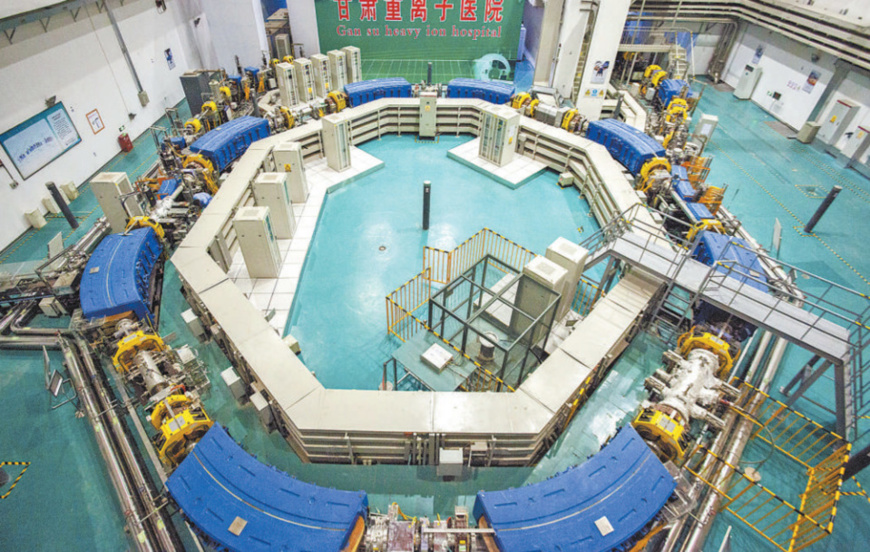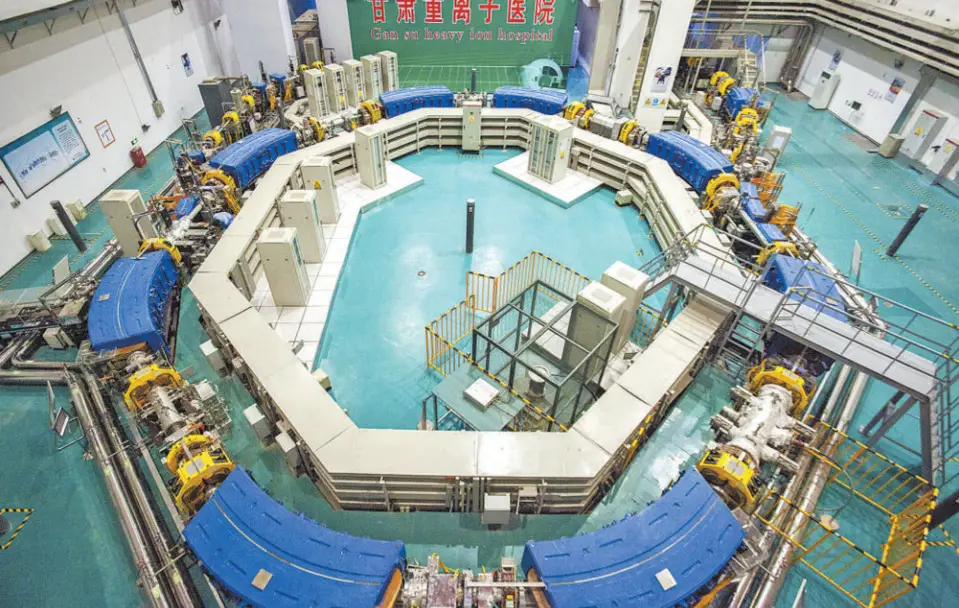By Liu Shiyao, Shen Shaotie, People’s Daily

Photo shows the heavy ion accelerator facility for cancer treatment in Wuwei, northwest China's Gansu province. (Photo/Courtesy of the Institute of Modern Physics under the Chinese Academy of Sciences)
China’s first self-developed heavy ion accelerator facility for cancer treatment is used in radiotherapy for cancer patients in the heavy ion center of Wuwei Tumor Hospital in northwest China’s Gansu province.
The facility, also known as heavy ion medical accelerator or carbon ion therapy system, is developed and maintained by the Institute of Modern Physics under the Chinese Academy of Sciences (CAS) and a subsidiary company of the institute. Wuwei Tumor Hospital is in charge of its clinical operation.
Mankind has been using radioactive elements and isotopes to kill cancer for many years. Relevant treatment methods include photon beam radiation therapy that uses gamma rays or x-rays, proton beam therapy that uses protons, and heavy ion radiotherapy that uses carbon ion beams to treat cancer. Among them, heavy ion radiotherapy has clear advantages over other therapies.
China has accumulated technologies in heavy ion for more than 60 years, during which the country has established a good number of big science projects and devices.
Since 1993, Chinese researchers started to work on the employment of heavy ion in cancer treatment. However, the application of basic heavy ion research results in clinical use and the endeavor to turn scientific research devices into medical devices were not as easy as they sound.
In order to make possible heavy ion radiotherapy, researchers have overcome many challenges, including making the accelerator’s perimeter shorter and its structure more compact through technological innovation and ensuring minimal errors in the stability of the heavy ion beams when they “hit” tumors, which required greater precision in technological process and stable and reliable performance of equipment.
After nearly 30 years of efforts, China put into clinical application its first self-developed heavy ion medical accelerator system in Wuwei, Gansu province, in March 2020, becoming the fourth country in the world that is capable of independently developing and putting into clinical use heavy ion therapy system.
The domestically developed heavy ion medical accelerator is not inferior to imported ones in terms of both performance indexes and clinical feedback, according to Xiao Guoqing, head of the branch of the CAS in Lanzhou, capital of Gansu province, who noted that the homemade facility has an evident price advantage over imported ones as its cost is only one third or half of that of similar facilities made in developed countries.
In addition, the perimeter of the synchrotron of the medical facility is only 56.2 meters, the shortest among that of all heavy ion medical accelerators in the world, which means less cost to the hospital that employs the facility, said Xiao.
Thanks to the full-fledged processing and manufacturing systems at home, maintenance cost of the medical facility has been significantly reduced, and maintenance service can be received in a timely manner, Xiao added.
“The time and frequency of heavy ion therapy for patients vary according to their diseases. Follow-up visits to patients who have completed their treatment have shown that the therapy is effective and has helped control the condition of patients,” said Ye Yancheng, president of Wuwei Tumor Hospital.
The heavy ion center of Wuwei Tumor Hospital has so far treated 375 patients (including patients treated during the clinical trial stage of the medical facility), with the treatments covering such diseases as central nervous system tumors, head, neck and skull base tumors, thoracic and abdominal tumors, and pelvic tumors, according to Ye.
The heavy ion treatment system is expected to be promoted around the country by CAS Ion Medical Technology Co., Ltd. (CASHIM), a company focusing on the commercialization of heavy ion cancer therapy technology.
Besides the heavy ion center of Wuwei Tumor Hospital that have been put into operation and a heavy ion medical facility that is about to enter clinical trial in Lanzhou, four more such facilities are under construction in other cities of the country. In addition, many cities have signed cooperation agreements for the deployment of the facility.
Population and geographic factors will be given full consideration in the construction and deployment of the medical facility, according to Ma Lizhen, board chairman of CASHIM, stressing that such medical facilities will be situated in regional medical centers of the country, so that the therapy can be accessible to more people.
China will continue to develop smaller versions of the medical facility, which will need less floor area and treatment cost, and leverage means like AI and 5G technologies to upgrade and transform relevant devices to make the facility smarter, Xiao said.
The country will also intensify efforts to foster talents for the heavy ion therapy system and cultivate more frontline radiologists and radiation physicists, in a bid to make heavy ion medical accelerator benefit more patients, Xiao added.
The facility, also known as heavy ion medical accelerator or carbon ion therapy system, is developed and maintained by the Institute of Modern Physics under the Chinese Academy of Sciences (CAS) and a subsidiary company of the institute. Wuwei Tumor Hospital is in charge of its clinical operation.
Mankind has been using radioactive elements and isotopes to kill cancer for many years. Relevant treatment methods include photon beam radiation therapy that uses gamma rays or x-rays, proton beam therapy that uses protons, and heavy ion radiotherapy that uses carbon ion beams to treat cancer. Among them, heavy ion radiotherapy has clear advantages over other therapies.
China has accumulated technologies in heavy ion for more than 60 years, during which the country has established a good number of big science projects and devices.
Since 1993, Chinese researchers started to work on the employment of heavy ion in cancer treatment. However, the application of basic heavy ion research results in clinical use and the endeavor to turn scientific research devices into medical devices were not as easy as they sound.
In order to make possible heavy ion radiotherapy, researchers have overcome many challenges, including making the accelerator’s perimeter shorter and its structure more compact through technological innovation and ensuring minimal errors in the stability of the heavy ion beams when they “hit” tumors, which required greater precision in technological process and stable and reliable performance of equipment.
After nearly 30 years of efforts, China put into clinical application its first self-developed heavy ion medical accelerator system in Wuwei, Gansu province, in March 2020, becoming the fourth country in the world that is capable of independently developing and putting into clinical use heavy ion therapy system.
The domestically developed heavy ion medical accelerator is not inferior to imported ones in terms of both performance indexes and clinical feedback, according to Xiao Guoqing, head of the branch of the CAS in Lanzhou, capital of Gansu province, who noted that the homemade facility has an evident price advantage over imported ones as its cost is only one third or half of that of similar facilities made in developed countries.
In addition, the perimeter of the synchrotron of the medical facility is only 56.2 meters, the shortest among that of all heavy ion medical accelerators in the world, which means less cost to the hospital that employs the facility, said Xiao.
Thanks to the full-fledged processing and manufacturing systems at home, maintenance cost of the medical facility has been significantly reduced, and maintenance service can be received in a timely manner, Xiao added.
“The time and frequency of heavy ion therapy for patients vary according to their diseases. Follow-up visits to patients who have completed their treatment have shown that the therapy is effective and has helped control the condition of patients,” said Ye Yancheng, president of Wuwei Tumor Hospital.
The heavy ion center of Wuwei Tumor Hospital has so far treated 375 patients (including patients treated during the clinical trial stage of the medical facility), with the treatments covering such diseases as central nervous system tumors, head, neck and skull base tumors, thoracic and abdominal tumors, and pelvic tumors, according to Ye.
The heavy ion treatment system is expected to be promoted around the country by CAS Ion Medical Technology Co., Ltd. (CASHIM), a company focusing on the commercialization of heavy ion cancer therapy technology.
Besides the heavy ion center of Wuwei Tumor Hospital that have been put into operation and a heavy ion medical facility that is about to enter clinical trial in Lanzhou, four more such facilities are under construction in other cities of the country. In addition, many cities have signed cooperation agreements for the deployment of the facility.
Population and geographic factors will be given full consideration in the construction and deployment of the medical facility, according to Ma Lizhen, board chairman of CASHIM, stressing that such medical facilities will be situated in regional medical centers of the country, so that the therapy can be accessible to more people.
China will continue to develop smaller versions of the medical facility, which will need less floor area and treatment cost, and leverage means like AI and 5G technologies to upgrade and transform relevant devices to make the facility smarter, Xiao said.
The country will also intensify efforts to foster talents for the heavy ion therapy system and cultivate more frontline radiologists and radiation physicists, in a bid to make heavy ion medical accelerator benefit more patients, Xiao added.
 Menu
Menu
 China’s first self-developed heavy ion accelerator for cancer treatment in successful clinical use
China’s first self-developed heavy ion accelerator for cancer treatment in successful clinical use
















